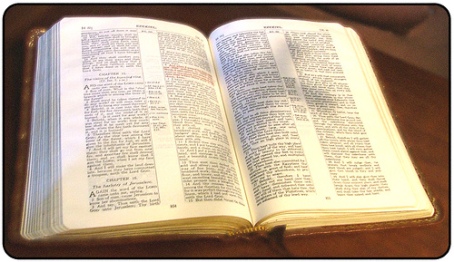In blog posts in the past, I have written about how some believers seem to put the Bible on a pedestal, above God. I’m sure they would deny that, but that’s what it amounts to. God is constrained by what the Bible says (or appears to say) about Him.
But consider very carefully: if in any way the Bible is given superiority over God, then that can be thought of as Bible worship; a kind of idolatry (setting something up in the place of God), or, more specifically, what’s known as ‘Bibliolatry’.
It’s worth considering personally and individually how you place the Bible. If it’s above God; if what God is and is not allowed to say is dictated by the Bible, then that is Bibliolatry. And it’s serious – serious in that if you persist in this idolatry, you will be missing out on most of the joy of the proper Relationship with God that is yours as a birthright.
So, think about it carefully.
But don’t dwell on it too long, because focusing on ‘sin’ is one of the easiest ways to take your gaze away from the One to Whom it should always be directed, namely Jesus.
Anyhow, less of my goings on. I wanted to share with you another great piece by Mike Douglas, which covers this very subject. Over to Mike:
“The Bible shouldn’t be worshiped. It should help us seek the One worthy of worship. Much of this post is inspired by a similar blog by John Pavlovitz in March 2015 combined with my thoughts in my words. I am indebted to him for it.
The Bible says it, I believe it, and that settles it.
“You’ve heard that phrase before. You’ve read it on bumper stickers. It’s an odd mantra that often describes the odd relationship some Christians have with our Bible. Many of us have made The Bible the single pillar of our faith, but not all of us have a complete grasp on what it says.
“We’ll agree without question that it is filled with words from the mouth of God, and yet we can’t really be bothered to crack it open all that often. We so crave a Bible that we can use quickly and neatly to support our various arguments and discussion points, but that Bible doesn’t exist.
“That doesn’t mean the Bible isn’t true, or divinely inspired, or “useful for teaching, rebuking, correcting and training in righteousness.” It just means that it is not a simple book and should not be treated like one.
A Problem
“Rather than admit the problems we face in understanding the Bible, too many Christians simply hide behind some reactionary, line-drawing, black and white, all-or-nothing rhetoric. The Bible says it, I believe it, and that settles it. But we often come to our positions without ever taking the time to truly understand what the Bible says. To name a few: same sex attraction, politics, war, racism.
“That’s because the Bible has become for many, something to be worshiped, rather than something to help us seek the One worthy of worship. The Trinity is now Father, Son and Holy Scripture. We’ve come to see the Bible as the destination of our spiritual journey, rather than essential reading on the way to the Promised Land.
“You can see this everywhere; Facebook, and on talk shows, and from pulpits. Many use the Bible like an oversized power tool that we couldn’t be bothered to consult the manual for.
Ouch! I know. But show me I’m wrong.
And we can’t disagree. If we do, the other is obviously wrong and must be criticized vehemently. And the rest of the world looks on shaking its head.
For Jesus followers, we must accept that those who have come to a different conclusion about the Bible, often have done so through the same study, reflection, and sincere desire to know the very heart of God that we have.
THE Problem
“The real problem, is putting the Bible on the same level as God; something the Bible itself never asks us to do. It is not, as we so often say, “The Word of God” from John 1:1, JESUS IS. Look it up!
“Additionally, we’ve decided that The Bible speaks everything that God ever has or ever will say, and that He’s said it exactly as we’ve determined, translated, and believe it to be. In other words, by elevating the Bible to the same level as God, and by leaning on our own understanding of its 66 books, we’ve crafted a God that seems to think a lot like we do, vote like we vote, hate who we hate and bless what we bless.
“Ouch? Sorry. But then again…
“The question we need to ask ourselves as modern believers, is whether we really trust God to speak clearly and directly to someone, independent of the Bible. Sometimes it seems we believe that the words of the Bible are, as it says, “living and active “, but believe that God is not. The inevitable outcome of thinking the Bible is the last and only word, is a God who is no longer living.
“If we read the Scriptures like the will of a dead relative who is never coming back, then yes, we will cling to them as the sole voice through which He speaks. However, if we trust in a Jesus who is alive, and in a God, who is present through His Holy Spirit, we can be confident that His voice is not confined to 66 books.
“Regardless of how much we trust and revere it, the Bible can never be God
“And it doesn’t need to be.
“God is God, and the only one capable of being so. The Bible and God can never ever be the exact same thing, and if we can’t honestly admit that, we’ll never be able to have meaningful discussion about either.
“So, what do we do with the fact that the Bible is not God?
“The number one use for the Bible is to introduce us to Jesus. To see what He has done for us and see the model He left for us to follow. That model is Him. As Bill Johnson says, ‘Jesus is perfect theology’. That means, simply, for your theology to be correct, it must be reflected in the life, words, actions and love Jesus demonstrated while on earth.
“Then, and only then:
- We cherish it, as a photo album of the family of faith we come from.
- We dig deeply into it, finding the treasures to be found there.
- We study it, until we can clearly see the character of God.
- We strip away time, tradition, language, and culture, to find the truths that transcend time and apply to our lives. That’s often different than literal truth.
- We see the faith, the character, and the mistakes of those who’ve come before us, to help us as we walk this journey.
“As Christians, we should read, respect, and when convicted, obey the Bible, but we should never worship it.”
Original post can be seen here.













